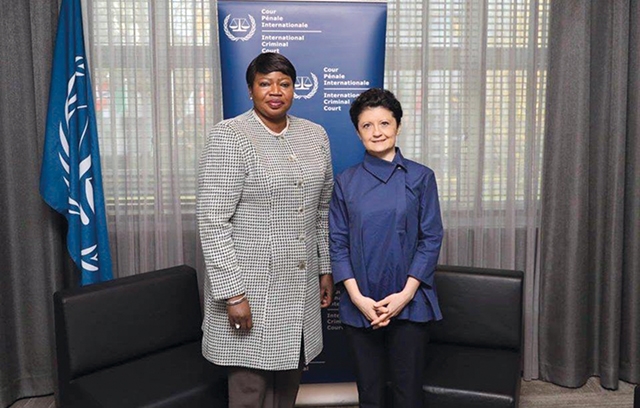ICC: Georgia-Russia War Investigation May Conclude in 2020
The International Criminal Court (ICC) might complete the investigation into the 2008 Russia-Georgia August War next year, announced the Chief Prosecutor of the International Criminal Court, Fatou Bensouda, whose term expires at the end of 2020.
Bensouda had a meeting with the Justice Minister of Georgia, Thea Tsulukiani, in The Hague, on the sidelines of the18th session of the ICC Assembly of State Parties. During the meeting, Bensouda noted that the investigation is active and it is not excluded that the process will be finished before her term in the office expires.
The Ministry of Justice press service reports that at the meeting Tsulukiani talked about the Russian-Georgian war investigation and noted that the population of Georgia, which was the victim of the 2008 Russia-Georgia war and witnessed ethnic cleansing, crimes against humanity and war crimes, is waiting for concrete results to restore justice. It was also noted at the meeting that the cooperation between the parties is at a very high level.
Before meeting Prosecutor Bensuda, Thea Tsulukiani met with O-Gon Kwon, Chairman of The Hague Tribunal. The parties discussed Georgia's participation in the Assembly's activities and the nomination of Georgia as a judge for The Hague court.
The elections of a judge to The Hague will be held in December 2020, with six judges from different regions to be elected. Georgia intends to nominate a judge for the Eastern European quota, as the Czech judge's term of office is expected to expire.
During her speech at the 18th Assembly of The Hague Tribunal, the Georgian Justice Minister stated that Georgia has all the resources needed to nominate qualified and experienced candidates who can compete with the other Eastern European candidates.
If successful, Georgia will have a judge in The Hague for the first time, and for that purpose, a candidate will be selected nationally to comply with the Rome Statute and Assembly Resolution, which will launch an active election campaign internationally.
In her speech, Tsulukiani publicly asked the representatives of more than 100 states to support Georgia in nominating a candidate from Eastern Europe in 2020.
The investigation of the Russia-Georgia war has been underway since early 2015, after Bensouda requested permission from ICC judges to begin an investigation into alleged cases of war crimes and crimes against humanity during the war in 2008.
The ICC chamber authorized Bensouda to investigate the war at the end of January 2015 after examining the prosecutor’s request and supporting material, including testimonies by or on behalf of 6,335 victims of the conflict.
However, Russia said they would not cooperate with the ICC to investigate possible war crimes committed during the 5-day conflict.
"As of February 1, 2016, the Russia Federation has not ratified the Rome Statute of the International Criminal Court and the document has not come into power,” Russia’s Justice Ministry said after Bensouda was granted the right to start the investigation.
The Rome Statute is the treaty that established the ICC. It was adopted at a diplomatic conference in Rome on July 17, 1998, and entered into force on July 1, 2002.
The ICC said the types of crimes allegedly committed in the 2008 war included:
• Crimes against humanity, such as murder, forcible transfer of citizens, and persecution;
• War crimes such as attacks against the civilian population, willful killing, intentionally directing attacks against peacekeepers, destruction of property and pillaging.
It also noted that the crimes allegedly happened between 1 July and 10 October 2008.
To note, eleven years after the August War in 2008, Georgia’s South Ossetia and Abkhazia regions are still occupied by Russia.
The war, which lasted five days, brought Georgia a human loss of 412 persons, including 170 soldiers, 14 police officers, and 228 civilians. Three journalists were killed, while six were wounded. 1,747 people were wounded on the Georgian side, including 973 soldiers, 227 police officers, and 547 civilians.
130, 000 Internally Displaced Persons (IDPs) were created, of which 26,000 are still being denied the right to return.
35,000 houses were burned, ruined or destroyed on the territory of Georgia while 125 villages remain occupied.
By Tea Mariamidze
Photo: Chief Prosecutor of the International Criminal Court, Fatou Bensouda and Justice Minister of Georgia, Thea Tsulukiani












